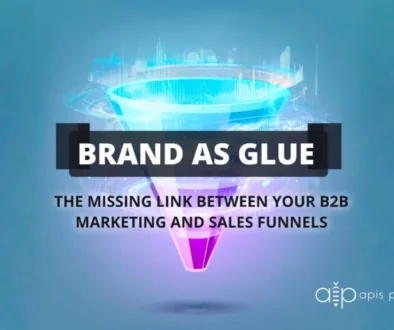Brand Is Not a Cost—It’s an Investment in Your Success

How Your Brand Experience Threads Through Every Aspect of Your Business
For small and mid-sized B2B businesses, it’s tempting to view a cohesive brand as a “nice to have”—something to refine later, once sales stabilize or budgets grow. But the most successful companies see it differently:
Your brand is not a marketing cost. It’s the infrastructure your revenue growth depends on.
From the first impression to the final touchpoint, your brand is the consistent thread that shapes how clients perceive you. It fuels growth, accelerates sales, attracts top talent, and amplifies word-of-mouth. When executed well, it’s a strategic multiplier that outpaces competitors and drives sustainable profitability.
“Your brand is a story unfolding across all customer touchpoints.”
— Jonah Sachs, author of Winning the Story Wars
Peter Weinberg and Jon Lombardo of LinkedIn’s B2B Institute emphasize, “B2B brands that prioritize experience see buying decisions shortened by 16 weeks and outperform competitors in revenue growth.”
This isn’t just theory—it’s a reality woven through every business function.
Business Strategy (Why You Sell): Your Brand Is Your Compass
A clear, lived-out brand anchors your purpose. It communicates why your business exists, not just what it offers. In B2B, where trust fuels long-term partnerships, brand clarity helps you position yourself in a crowded market and scale more intentionally.
In fact, 71% of B2B marketers say strong branding is critical to communicating a unique market position, enabling faster strategic alignment with clients, partners, and investors.
“Brand is the sum total of how someone perceives a particular organization. Branding is about shaping that perception.”
— Ashley Friedlein, founder of Econsultancy
When your business strategy is driven by a well-defined brand purpose, decision-making becomes clearer. It guides everything from which products you launch, what partnerships you form, and what markets you should enter. It ensures consistency and coherence across the board, helping your stakeholders feel a sense of concrete stability.
Product (What You Sell): Brand Elevates Perceived Value
Your product is only as strong as the story and experience wrapped around it. Especially in B2B, where offerings can be complex or intangible, a strong brand helps prospects connect the dots between their problems and your solution:
A study by McKinsey found that companies with strong, consistent branding across their offerings outperform those without by up to 20%. Why? Because trust and recognition lower the perceived risk of choosing you over a competitor.
According to Harvard Business Review, 40% of customers choose one brand over another simply because the experience “feels right,” aligning with their values.
When the product experience aligns with brand promises, from demos to documentation, it becomes a competitive differentiator and trust accelerator.
Marketing (Who You Sell To): Consistency Converts
B2B buyers don’t respond to noise—they respond to relevance, clarity, and consistency. That’s why fragmented branding kills momentum. A study by Lucidpress shows that brands with consistent presentation across platforms see 23% more revenue and are 3–4× more likely to be top-of-mind.
“Customer experience is the only true differentiator.”
— Annette Franz, CX expert
Marketing is where brand gets tested in the wild. If your visuals, messaging, and tone don’t align across every campaign and channel, you’re leaking brand equity.
Sales (When and Where You Sell): Brand Closes Deals Faster
Your salespeople and customer service team are often the living, breathing extension of your brand.
If your marketing feels polished and thoughtful but your sales pitch is transactional or misaligned, it creates a trust gap. Conversely, when your brand values show up in sales interactions, whether it’s empathy, responsiveness, or clarity, it builds credibility and connection.
According to Salesforce’s “State of the Connected Customer” report, 80% of customers say the experience a company provides is as important as its products or services.
That experience includes how, where, and when you sell. Brand-consistent sales decks, proposals, onboarding experiences, and follow-ups all matter.
Your brand reputation is doing the selling before your team ever hops on a call. In fact, strong branding can shorten sales cycles by up to 16 weeks, because buyers already trust you by the time they’re in the funnel.
“Join customer conversations across every channel. Trust is built in real-time.”
— Marc Benioff, CEO of Salesforce
In B2B, where deals are high-stakes and high-touch, credibility is currency, and brand builds it.
Hiring (Who Sells For You): Brand Attracts Culture-Carriers
Your brand doesn’t just attract clients. It attracts talent. Your employees are your most visible brand ambassadors. A strong employer brand helps you attract the right talent—people who align with your values and champion your company inside and out. Your brand doesn’t just attract clients. It attracts talent.
Employees want to work for companies with values they share. In fact, LinkedIn’s Employer Branding Statistics report found that 75% of job seekers consider an employer’s brand before even applying for a job.
When your brand shows up clearly on your careers page, in interviews, and through internal culture, it helps you recruit and retain the right people—people who become ambassadors for your brand every day.
Brand-informed hiring also helps build internal alignment. Your team should be able to articulate the brand just as clearly as your CMO or your clients.
LinkedIn research shows that companies with strong employer branding see 50% more qualified applicants and 28% lower turnover rates.
“Customer experience isn’t an expense—it bolsters your brand.”
— Stan Phelps, branding expert
In other words, the people you hire are part of the brand experience your clients feel. Invest accordingly.
Community (How the Industry Sees You): Brand Builds Advocates
Reputation isn’t just about clients—it’s also about how peers, partners, and platforms view your business. In the B2B world, 58% of purchasing decisions are influenced by peer recommendations, and 95% of executives link consistent brand experience to revenue growth.
“Trust isn’t a strategy—it’s an investment in long-term partnerships.”
— Vineet Gupta, SaaS strategist
Through thought leadership, social proof, or event presence, your brand is always broadcasting. Make it intentional.
Final Thought: Brand Isn’t a Big-Business Luxury; It’s a Small-Business Growth Engine
The takeaway is simple: brand is not a surface-level concern or a one-time investment. It’s the scalable foundation of every business function, from lead gen to LTV.
Done right, brand drives:
- Faster sales cycles
- Higher customer lifetime value (LTV)
- Increased talent retention
- Stronger market differentiation
- Advocacy, turning clients into organic marketers
As McKinsey reports, companies that embed brand across operations don’t just grow, they dominate. Start small: audit one customer touchpoint this week. The thread you strengthen today becomes your competitive moat tomorrow.
Ready to Strengthen Your Brand?
A great brand is a foundational element that influences every aspect of how your business runs and grows. At Apis Productions, we craft brands that build trust, cut through noise, and deliver value at every touchpoint.
If you’re ready to strengthen your brand experience, let’s talk.




